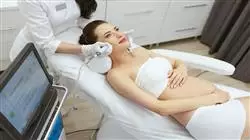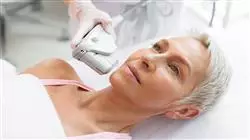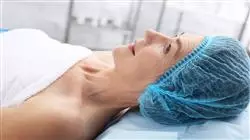University certificate
The world's largest faculty of physiotherapy”
Why study at TECH?
Your career as a physiotherapist will take a turn for the better when you specialize in Dermocosmetics"

People are looking for increasingly specialized skin care. Dermocosmetics initially started with a few disciplines that monopolized all the treatments, making it a very restricted and not very innovative area. However, the demand for new techniques and methodologies caused a transformation in this field and new disciplines were providing solutions to the different aesthetic problems.
In this way, Physiotherapy is one of them, and it is currently one of the fastest growing areas in the field of skin aesthetics. There are many patients looking for specialized physiotherapists, but there is still a lack of experts in the field who can offer the right services.
For this reason, this Postgraduate diploma in Dermocosmetics for Physiotherapists is the answer for all those physiotherapists who are looking for a way to progress and find new career paths, as it provides them with numerous skills that they can put into practice immediately.
You know that this qualification will help you in your professional performance. Don't wait any longer and enroll"
This Postgraduate diploma in Dermocosmetics for Physiotherapists contains the most complete and up-to-date scientific program on the market. The most important features include:
- The development of practical cases presented by experts in Dermocosmetics applied to Physiotherapy
- The graphic, schematic, and practical contents with which they are created, provide scientific and practical information on the disciplines that are essential for professional practice
- Practical exercises where self-assessment can be used to improve learning
- Its special emphasis on innovative methodologies
- Theoretical lessons, questions to the expert, debate forums on controversial topics, and individual reflection assignments
- Content that is accessible from any fixed or portable device with an Internet connection
More and more patients are looking for expert dermocosmetic physiotherapists to provide them with the solutions they are
looking for"
The program’s teaching staff includes professionals from the sector who contribute their work experience to this educational program, as well as renowned specialists from leading societies and prestigious universities.
The multimedia content, developed with the latest educational technology, will provide the professional with situated and contextual learning, i.e., a simulated environment that will provide immersive education programmed to learn in real situations.
This program is designed around Problem-Based Learning, whereby the professional must try to solve the different professional practice situations that arise during the course. For this purpose, the student will be assisted by an innovative interactive video system created by renowned and experienced experts.
You will be able to launch new services that will attract new patients"

The key to success in the field of Physiotherapy is specialization"
Syllabus
The contents of this Postgraduate diploma in Dermocosmetics for Physiotherapists have been designed by leading specialists in the field, who have been responsible for providing all their knowledge and experience so that students enjoy high-level learning. In this way, students who complete this program will be able to apply everything they have learned to their professional fields. This qualification is, therefore, what all physiotherapists seeking to specialize in skin cosmetics need.

The best content, now at your reach. Don't let it pass you by"
Module 1. Aesthetic Physiotherapy
1.1. Aesthetic Physiotherapy: New Developments in the Profession
1.2. NCP Applied to Aesthetics
1.3. Aesthetic Physiotherapy: New Developments in the Profession
1.4. Hygiene in the Aesthetic Office
1.4.1. Antiseptics
1.4.2. Hand Hygiene
1.4.3. Utensil Hygiene
1.4.4. Sanitary Waste Management
1.5. Organization of the Aesthetic Practice
1.6. Aesthetic Practice Management
1.7. The Ethical-Legal Aspect of Aesthetic Physiotherapy: Code of Ethics and Ethical Problems
1.7.1. Criminal and Civil Liability of Physiotherapy Personnel
1.7.2. Liability Insurance
1.7.3. Informed Patient Consent Forms: Guidelines and Generic Models
1.8. Quality Management in Aesthetic Physiotherapy Practice
1.9. Urgent Care in the Aesthetic Physiotherapy's Office
1.10. Complications in Aesthetic Physiotherapy
Module 2. Module 2. Aging and Cosmetic Assessment in Aesthetic Physiotherapy
2.1. History of Antiaging Medicine
2.2. Theories of aging. Pathophysiology
2.3. Species and Longevity
2.4. Mechanisms of Cellular Aging
2.5. Mitochondria
2.6. Chronobiology I. Suprachiasmatic Pineal Nucleus. Circadian Rhythm
2.7. Chronobiology II Sleep and Sleeplessness
2.8. Immunity. Immunosenescence
2.9. Telomeres and Telomerase
2.10. Exposome and Aging
Module 3. Skin
3.1. Skin Anatomy and Structure of the Skin
3.2. Skin Appendages
3.2.1. Hair
3.2.2. Nails
3.2.3. Sebaceous Glands
3.2.4. Sweat Glands
3.3. Skin Functions and Elementary Lesions
3.3.1. Protection
3.3.2. Metabolism
3.3.3. Temperature Regulation
3.3.4. Sensory
3.3.5. Excretory
3.3.6. Energy Reserve
3.4. Skin Care in the Different Stages of Life: Neonatal, Pediatric, Adolescent, Adult, Geriatric, Pregnancy
3.4.1. Neonatal
3.4.2. Pediatric
3.4.3. Adolescent
3.4.4. Adult
3.4.5. Geriatric
3.4.6. Pregnancy
3.5. Embryology of the Skin and Skin Appendages
3.5.1. Skin Development
3.5.2. Hair Development
3.5.3. Nail Development
3.5.4. Skin Gland Development
3.6. Skin Types
3.6.1. Density
3.6.2. Skin Emulsion
3.6.3. Skin Phototype
3.6.4. Status
3.7. Skin Hygiene
3.8. Skin Hydration
3.8.1. Manual Techniques
3.8.2. Materials and Technical Methods
3.8.3. Specific Cosmetics
3.8.4. Equipment
Module 4. Most Frequent Dermatological Pathologies
4.1. Acne
4.2. Rosacea
4.3. Seborrheic Dermatitis
4.4. Atopic Dermatitis
4.5. Contact Dermatitis
4.6. Pigmentation Disorders: Hyperpigmentation
4.7. Pigmentation Disorders: Hypopigmentation
4.8. Psoriasis
4.9. Skin Infections and Infestations Caused by Pathogenic Agents: Bacteria
4.10. Skin Infections and Infestations Caused by Pathogenic Agents: Viruses
4.11. Ichthyosis
4.12. Urticaria and Angioedema
4.13. Scars

This is one of those opportunities that can change your life"
Postgraduate Diploma in Dermocosmetics for Physiotherapists
In recent years, the demand for people who have sought new dermocosmetic treatments has steadily increased, giving room for various disciplines such as physiotherapy, which gives cosmetics and dermatology a large number of specialized treatments and techniques. That is why, in TECH Global University we created a Postgraduate Diploma in Dermocosmetics for Physiotherapists in which students will be able to acquire all the necessary skills to become great specialists in this dermatological area applied to physiotherapy. Understanding in this way, that these two fields are complementary and it is increasingly common to see experts working on these precepts; in this way, this course will boost the student to compete and excel in the labor market.
Study dermatology and cosmetics for physiotherapists completely online
This educational program has four modules in which topics such as dermo-aesthetic physiotherapy, aging and cosmetic assessment in dermo-aesthetic physiotherapy, skin and dermocosmetics will be addressed. All of the above is designed with the objective of acquiring the fundamental knowledge of aesthetic treatments and the integral management of the patient, being able to make an accurate diagnosis in order to apply the most precise treatment and reinforce the tools that a physiotherapist uses in the approach to the different pathologies. Finally, the study plan is elaborated by teachers specialized in both the educational and professional fields of this health area.
Study an online Postgraduate Diploma
The methodology implemented by TECH in this educational course is related to real clinical cases that will allow the student to investigate, establish hypotheses, and solve the medical picture. The entire program will be developed online, this includes asynchronous content, to develop them you only have to access from a device connected to the Internet. Finally, throughout the 600 hours in which the program will be developed, you can demonstrate theoretical lessons, discussion forums and individual reflection work, through teaching and audiovisual elements.







